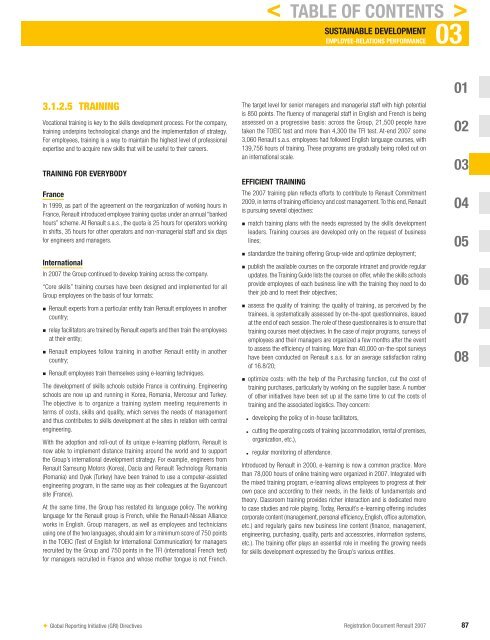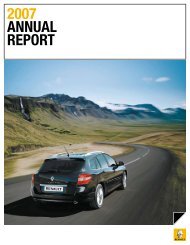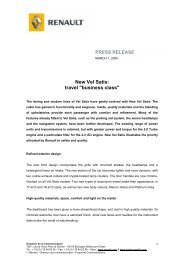2007 Interactive Registration Document - Renault
2007 Interactive Registration Document - Renault
2007 Interactive Registration Document - Renault
Create successful ePaper yourself
Turn your PDF publications into a flip-book with our unique Google optimized e-Paper software.
3.1.2.5 TRAINING<br />
Vocational training is key to the skills development process. For the company,<br />
training underpins technological change and the implementation of strategy.<br />
For employees, training is a way to maintain the highest level of professional<br />
expertise and to acquire new skills that will be useful to their careers.<br />
TRAINING FOR EVERYBODY<br />
France<br />
In 1999, as part of the agreement on the reorganization of working hours in<br />
France, <strong>Renault</strong> introduced employee training quotas under an annual “banked<br />
hours” scheme. At <strong>Renault</strong> s.a.s., the quota is 25 hours for operators working<br />
in shifts, 35 hours for other operators and non-managerial staff and six days<br />
for engineers and managers.<br />
International<br />
In <strong>2007</strong> the Group continued to develop training across the company.<br />
“Core skills” training courses have been designed and implemented for all<br />
Group employees on the basis of four formats:<br />
n<br />
n<br />
n<br />
n<br />
<strong>Renault</strong> experts from a particular entity train <strong>Renault</strong> employees in another<br />
country;<br />
relay facilitators are trained by <strong>Renault</strong> experts and then train the employees<br />
at their entity;<br />
<strong>Renault</strong> employees follow training in another <strong>Renault</strong> entity in another<br />
country;<br />
<strong>Renault</strong> employees train themselves using e-learning techniques.<br />
The development of skills schools outside France is continuing. Engineering<br />
schools are now up and running in Korea, Romania, Mercosur and Turkey.<br />
The objective is to organize a training system meeting requirements in<br />
terms of costs, skills and quality, which serves the needs of management<br />
and thus contributes to skills development at the sites in relation with central<br />
engineering.<br />
With the adoption and roll-out of its unique e-learning platform, <strong>Renault</strong> is<br />
now able to implement distance training around the world and to support<br />
the Group’s international development strategy. For example, engineers from<br />
<strong>Renault</strong> Samsung Motors (Korea), Dacia and <strong>Renault</strong> Technology Ro mania<br />
(Romania) and Oyak (Turkey) have been trained to use a computer-assisted<br />
engineering program, in the same way as their colleagues at the Guyancourt<br />
site (France).<br />
At the same time, the Group has restated its language policy. The working<br />
language for the <strong>Renault</strong> group is French, while the <strong>Renault</strong>-Nissan Alliance<br />
works in English. Group managers, as well as employees and technicians<br />
using one of the two languages, should aim for a minimum score of 750 points<br />
in the TOEIC (Test of English for International Communication) for managers<br />
recruited by the Group and 750 points in the TFI (international French test)<br />
for managers recruited in France and whose mother tongue is not French.<br />
✦ Global Reporting Initiative (GRI) Directives<br />
SUSTAINABLE DEVELOPMENT 03<br />
EMPLOYEE-RELATIONS PERFORMANCE<br />
The target level for senior managers and managerial staff with high potential<br />
is 850 points. The fl uency of managerial staff in English and French is being<br />
assessed on a progressive basis: across the Group, 21,500 people have<br />
taken the TOEIC test and more than 4,300 the TFI test. At-end <strong>2007</strong> some<br />
3,060 <strong>Renault</strong> s.a.s. employees had followed English language courses, with<br />
139,756 hours of training. These programs are gradually being rolled out on<br />
an international scale.<br />
EFFICIENT TRAINING<br />
The <strong>2007</strong> training plan refl ects efforts to contribute to <strong>Renault</strong> Commitment<br />
2009, in terms of training effi ciency and cost management. To this end, <strong>Renault</strong><br />
is pursuing several objectives:<br />
n<br />
n<br />
n<br />
n<br />
n<br />
< TABLE OF CONTENTS ><br />
match training plans with the needs expressed by the skills development<br />
leaders. Training courses are developed only on the request of business<br />
lines;<br />
standardize the training offering Group-wide and optimize deployment;<br />
publish the available courses on the corporate intranet and provide regular<br />
updates. the Training Guide lists the courses on offer, while the skills schools<br />
provide employees of each business line with the training they need to do<br />
their job and to meet their objectives;<br />
assess the quality of training: the quality of training, as perceived by the<br />
trainees, is systematically assessed by on-the-spot questionnaires, issued<br />
at the end of each session. The role of these questionnaires is to ensure that<br />
training courses meet objectives. In the case of major programs, surveys of<br />
employees and their managers are organized a few months after the event<br />
to assess the effi ciency of training. More than 40,000 on-the-spot surveys<br />
have been conducted on <strong>Renault</strong> s.a.s. for an average satisfaction rating<br />
of 16.8/20;<br />
optimize costs: with the help of the Purchasing function, cut the cost of<br />
training purchases, particularly by working on the supplier base. A number<br />
of other initiatives have been set up at the same time to cut the costs of<br />
training and the associated logistics. They concern:<br />
. developing the policy of in-house facilitators,<br />
. cutting the operating costs of training (accommodation, rental of premises,<br />
organization, etc.),<br />
. regular monitoring of attendance.<br />
Introduced by <strong>Renault</strong> in 2000, e-learning is now a common practice. More<br />
than 78,000 hours of online training were organized in <strong>2007</strong>. Integrated with<br />
the mixed training program, e-learning allows employees to progress at their<br />
own pace and according to their needs, in the fi elds of fundamentals and<br />
theory. Classroom training provides richer interaction and is dedicated more<br />
to case studies and role playing. Today, <strong>Renault</strong>’s e-learning offering includes<br />
corporate content (management, personal effi ciency, English, offi ce automation,<br />
etc.) and regularly gains new business line content (fi nance, management,<br />
engineering, purchasing , quality, parts and accessories, information systems,<br />
etc.). The training offer plays an essential role in meeting the growing needs<br />
for skills development expressed by the Group’s various entities.<br />
01<br />
02<br />
03<br />
04<br />
05<br />
06<br />
07<br />
08<br />
<strong>Registration</strong> <strong>Document</strong> <strong>Renault</strong> <strong>2007</strong> 87




